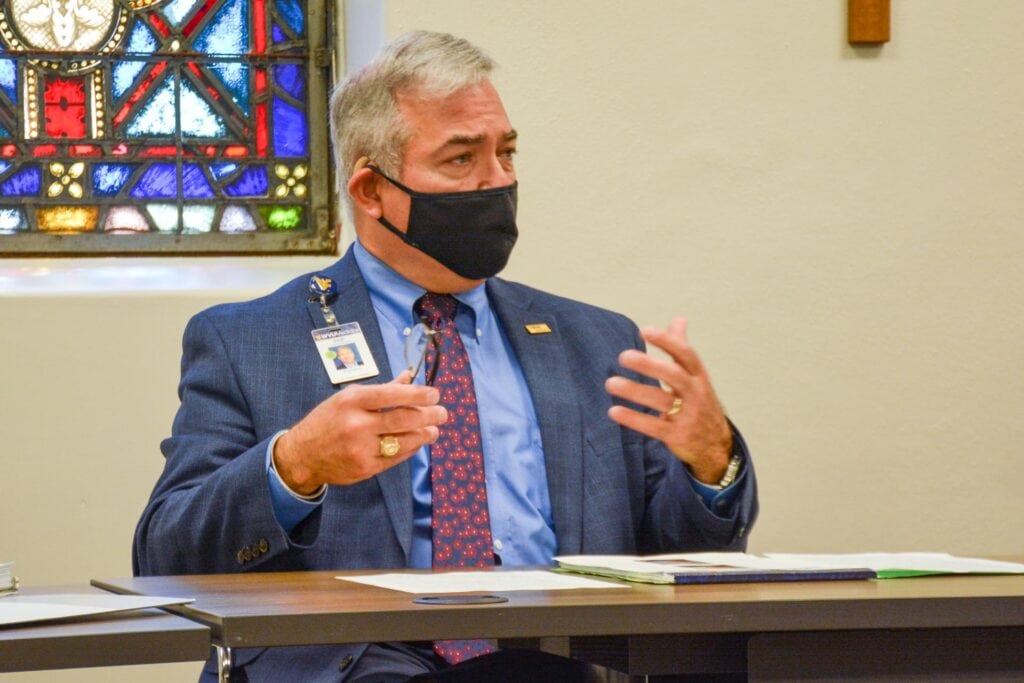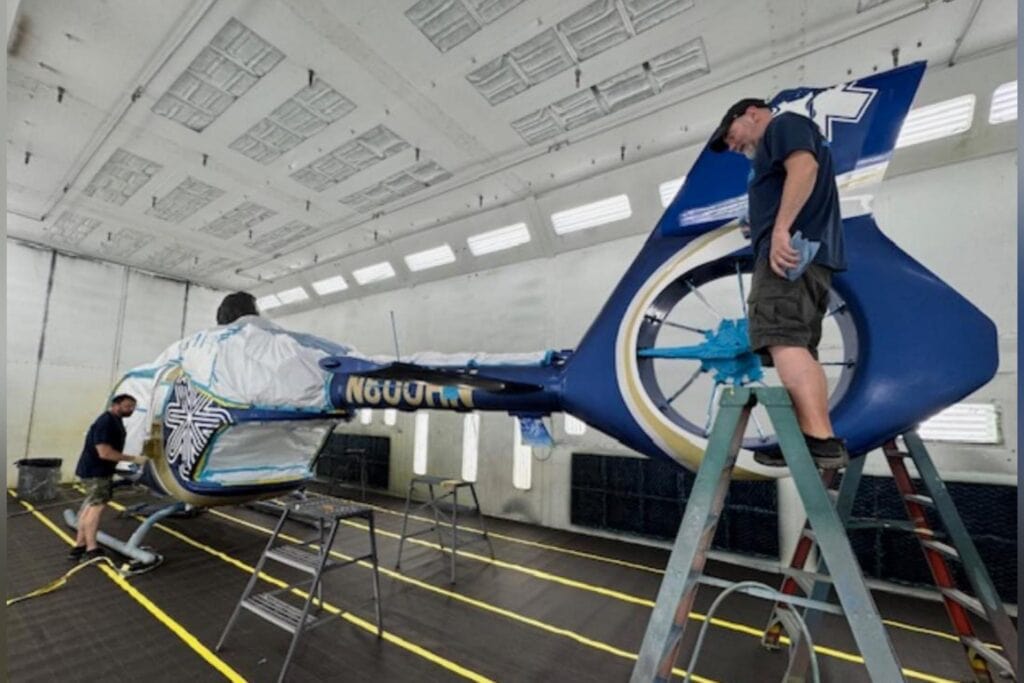BUCKHANNON – St. Joseph’s Hospital on Thursday filed a request for a public hearing related to another north-central West Virginia hospital’s plans to relocate near the Route 33-Interstate 79 interchange, saying it fears the move could result in a loss of “millions of dollars a year in revenue” and threaten its long-term viability.
St. Joseph’s Hospital president and CEO Skip Gjolberg told media outlets Thursday morning that Stonewall Jackson Memorial Hospital’s plans to build a 29-bed acute care hospital behind Sheetz in Weston could result in the Upshur County-based hospital losing its designation as a Critical Access Hospital, which would detrimentally impact its finances.
On April 26, Stonewall Jackson Memorial Hospital, a subsidiary of Mon Health System, filed a Certificate of Need application with the West Virginia Health Care Authority requesting to move from its current location in Hospital Plaza in Weston to Staunton Drive, where it would build a new hospital at a cost of nearly $56 million. According to the application, the hospital will primary serve Lewis and Gilmer county residents, although it will also serve patients from Braxton, Upshur and Harrison counties.
Gjolberg and St. Joseph’s Hospital Board of Trustees Chairman Dennis Xander said the hospital isn’t opposed to SJMH building a new facility; however, it is opposed to Mon Health constructing one at the proposed location. While Stonewall Jackson Memorial Hospital is currently located toward the western end of Lewis County, about 16.7 miles from St. Joseph’s, the relocation would put it within 11.8 miles.
Although the move is less than five miles, it could cause St. Joseph’s Hospital — which is owned by WVU Medicine — to lose its Critical Access Hospital status, which would affect how much money the hospital can recoup from Medicare and Medicaid.
“Back in the 1990s — actually in the Balanced Budget Act of 1997 – Congress created a certain category called Critical Access Hospitals, and they did that because there were a rash of hospitals closing across the United States when the government changed reimbursement structures,” Gjolberg explained. “They saw that, ‘Wow, these rural hospitals under this new reimbursement structure can’t operate, so we need to do something about this,’ and they created what’s called Critical Access status. We became a Critical Access Hospital back in the latter part of 2014, and it was a huge improvement for us in our financial stability.”
Critical Access status is a designation given to eligible rural hospitals by the Centers for Medicare and Medicaid Services in response to a slew of rural hospital closures during the 1980s and early 1990s, according to the Rural Health Information Hub.
“In the Balanced Budget Act when they established Critical Access status, there was a mileage requirement that [a hospital] had to be so many miles from another hospital,” Gjolberg said. “In typical terrain, it’s 35 (miles), but in West Virginia, you can apply for a mountainous terrain exemption, which we did and were granted, and that reduces [the requirement] to 15 miles.”

“Currently, Stonewall Jackson is at 16.7 miles from us,” he noted. “When they move or if they were to move to that new spot, they would be at 11.8 miles, so that is too close. That’s why we’re opposing this – because it will impact us. It will cost us millions of dollars a year in revenue from Medicare and Medicaid. As long as no other hospital comes within 15 miles of us, our Critical Access status is safe and sound, but if they get closer than that, then we end up losing that status.”
Any party affected by SJMH’s Certificate of Need application is required to file an objection by June 1 and a hearing will subsequently be set to review information from both health care systems.
“Today, we are submitting opposition to them building that hospital at that particular site where they want to build,” Gjolberg said. “We don’t oppose them building a new hospital, but that particular site puts them within 15 miles of St. Joe’s.”
Xander, who has been a member of the hospital’s Board of Trustees for over a decade, said Critical Access status has been a “lifeline” for the hospital.
“There was a period of time in 2014 that St. Joseph’s was at risk of closing the doors. I mean, we didn’t advertise it, but the financial situation was really, really bad,” Xander said. “It wasn’t that we didn’t have business. It’s that the cost of rural healthcare is just so much higher, and the economies of scale weren’t there, that we really struggled. It was also hard to recruit doctors here.”

Xander recalled a time prior to WVU Medicine acquiring St. Joseph’s Hospital when it had just 18 days of cash on hand.
“Eighteen more days, and we would have been out of business,” he said. “It was that bad. Under this Critical Access [designation], recognizing we’re a rural health care center with specific needs, we get 101% of our Medicare and Medicaid costs. When we have a Medicare and Medicaid patients, we can’t lose money on those people, and being granted Critical Access status was the lifeline that saved St. Joseph’s. Had it not been for critical access, we wouldn’t be here today.”
Xander said gaining Critical Access status not only enabled the hospital to move back into the black, but it also likely factored into WVU Medicine’s decision to acquire the hospital, which was consequently able to cut its costs, expand specialist services and improve benefits for its 400-plus employees.
Gjolberg said he’s long been an advocate for rural health care and enjoys working with other hospitals, but SJMH’s proposed move could jeopardize St. Joseph’s Hospital’s long-term viability and capacity to provide care to resident in Upshur and surrounding counties.
Sister Francesca Lowis, vice president of Mission Integration, said Thursday she wanted to emphasize the location is the sole reason for the objection.
“The bottom line is, we are not opposing them building a hospital,” she said. “We are opposing the location, and the reason is that if they do build, we lose our Critical Access status.”
Gjolberg noted the Upshur County hospital celebrated its 100th anniversary in March, saying it wants to continue to supply health care services “for another hundred years.”
“We want to keep delivering your babies and taking care of your families, your children and your parents,” he said.
In response to the filing by St. Joseph’s Hospital, a spokesperson for Mon Health System said SJMH’s main goal with the $56 million project is to give patients in Lewis County a modern, top-quality hospital.
“Our plans to modernize and replace the older SJMH facility has been known by all in the region for decades,” Kristina Adrian, executive director of marketing and communications, said. “The Board has been working diligently toward this improvement by saving more than $30 million to dedicate to this project and acquiring property in a very transparent way. We have submitted an application following healthcare authority methodology. Our main goal has been and continues to be to ensure the residents of greater Lewis County have a facility to match our national and regional accolades for top quality outcomes.”
In its Certificate of Need application, SJMH said the objectives of the project are to “improve access to services for patients in the service area, address deficiencies in the current facility that was constructed in 1972, better meet the changing demands of the current healthcare delivery system with a greater focus on outpatient services, provide new modern state of the art facilities and equipment for improved patient care and ensure the long term financial viability of the hospital.”
The application also addresses the accessibility criteria that “the proposal shall not adversely affect the continued viability of an existing hospital or health care services that serves a population of at least 10,000 not having 30-minute access to another hospital or critical access hospitals.”
SJMH notes that Buckhannon residents currently have access to at least four hospitals within that range.
“The main population center of Upshur County is Buckhannon, which has a population of about 5,500,” the application states. “All of the resident[s] in the areas surrounding the service areas, including those in Upshur County, have access to more than one hospital within a 30-minute drive. That includes Stonewall, St. Joseph’s of Buckhannon, Davis Medical Center and Broaddus Hospital.”
“The new facility is replacement facility that is relocating less than 5 miles to a new site,” the application notes. “That relocation should have no impact on the health care system in the service area.”
Gjolberg, however, on Thursday expressed concern about accessibility issues for people who live in more remote areas of the county.
He said that while driving an extra 20 minutes to SMJH or other hospitals might not be too much of a burden for Buckhannon residents, he would be worried for Upshur County residents living in outlying areas, particularly the southern end of the county, if St. Joseph’s Hospital would cease to exist.
“If you just think about people out in the southern parts of the county … if we weren’t here, how far would they have to travel to get to health care, especially if you’re in some of those more remote areas? If you live in Rock Cave, it’s going to be a lot tougher for those people who live down in that direction to get to medical care if we’re not here. That would be a long way for those folks to go.”
SJMH’s application does not address the Critical Access designation.
Jessica Alsop, vice president and general counsel for WVU Medicine/West Virginia University Health System, said WVU Medicine anticipates a hearing to be scheduled in September with a decision to be issued by the year’s end.



















